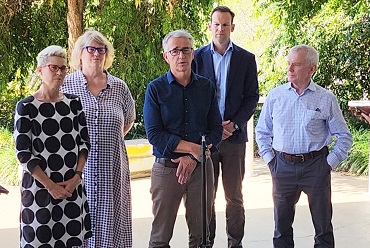The Australian Alert Service is the weekly publication of the Australian Citizens Party.
It will keep you updated on strategic events both in Australia, and worldwide, as well as the organising activities of the Citizens Party.
To subscribe to the Australian Alert Service, it's easy, and it's secure.
Lead Editorial
24 May 2023
Vol. 25 No. 21
The hearings of the Senate regional banking inquiry in Cloncurry and Ingham last week, while a small step in the inquiry process, were a stunning breakthrough in the fight for a return to public banking. This is reflected in a 19 May ABC News article which headlined the need for “solutions” for the bush, quoting all Senators involved about the transformative impact of public banking. (p. 3)
In this fight we have brought together political parties that never see eye-to-eye. We have united local communities, from those on the hardest right to farthest left, for a common solution. Politicians—pushed by the people—stared the banks down and the victories are coming.
This is also the way to stop war—a war building due to the demise of Anglo-American power. Its resolution requires incorporating those sinking powers into a new economic framework which benefits all nations.
Guest nations from the rising “majority” propelling that new framework, including India and Brazil, were invited to the 19-21 May Group of Seven summit. But they were not on board with the G7 agenda of more war and economic exclusion. Brazilian President Luiz Inácio Lula da Silva turned it back on them, insisting that meeting the interlinked economic and strategic challenges “will require a change of mentality. It’s necessary to overturn myths and abandon collapsed paradigms.”
Lula subsequently called for a special UN General Assembly session to discuss the war, while peace efforts continue from the Vatican, China, and African nations. An expanded US peace grouping under the banner of the Eisenhower Media Network of national security veterans cited President John F. Kennedy in a call for peace, headlined “The US Should Be a Force for Peace in the World”.
Kennedy’s central notion in the fight for peace, as expressed in a 10 June 1963 speech, was twofold. Firstly, most give up the fight before they even start because they think peace is “impossible”. But, said Kennedy, “Our problems are manmade—therefore, they can be solved by man. And man can be as big as he wants. No problem of human destiny is beyond human beings. Man’s reason and spirit have often solved the seemingly unsolvable—and we believe they can do it again.”
Secondly, he insisted on focusing on commonality rather than differences. While Americans abhor some elements of the Russian system, he said, they abhor war more—as do the Russians! “Among the many traits the peoples of our two countries have in common”, he said, “none is stronger than our mutual abhorrence of war.”
So, he rallied, “let us also direct attention to our common interests and to the means by which those differences can be resolved. ... in the final analysis, our most basic common link is that we all inhabit this small planet. We all breathe the same air. We all cherish our children’s future. And we are all mortal.”
This common spirit was expressed in the China-Central Asia Summit held 18-19 May in Xi’an, in Shaanxi Province, China, the launching point of the ancient Silk Road over 2,000 years ago, now a major Belt and Road Initiative hub. On its tenth anniversary, China and the leaders of five Central Asia nations hailed the beginning of a new phase of the BRI. And at the 22-nation Arab League summit on 19 May Syrian President Bashar al-Assad joined former foe Saudi Arabia for the first time in 12 years, calling for “peace in our region, development and prosperity instead of war and destruction”.
In this same spirit we may add a note to Julian Assange, whose case may also be close to turning (p. 5): “You’ve got the enemy right where you want them! They may think they’ve trapped you, but in fact, you’ve trapped them.” Freedom for Julian now means a substantial victory against the war party. A single step can accomplish the leap—let’s take it!
In this issue:
- Senators call for ‘people’s bank’ solution to regional branch closures
- FOI docs reveals ASIC collusion with politicians on oversight committee
- Biden no-show fires up demands to free Assange
- Paterson’s histrionics over Chinese drones & TikTok distracts from real corporate cybersecurity concerns
- The debate about ‘Independence for Taiwan’
- USA-China: Will Washington blow another peace opportunity?
- Academic Study: One of the four largest US banks at risk of bank run
- Epicentre of US banking crisis is not regional lenders
- Squeezed by the shorts: Time to ban short selling?
- A public bank is in the agenda!
- Passing of Tony Pun a great loss for all Australians
- ALMANAC: ACP’s submission to regional bank closures inquiry
Click here to find out how to subscribe. For freely available AAS articles, click here.
Click here for the archive of previous issues of the Australian Alert Service








